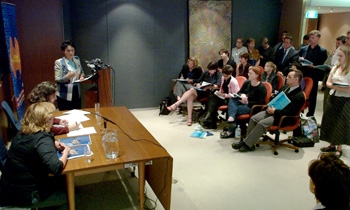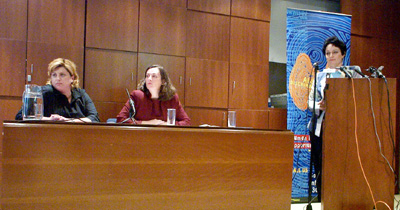A Bad Business - Media Release
A Bad Business
(Review of sexual harassment in employment complaints 2002)
Media Pack
In this section you can access:
Media Pack Index | Media Release | Launch Speech by Pru Goward | Speech by Nareen Young | Case Studies
Fact Sheets: Key Findings | The Complaints Process | Legal Definition of Sexual Harassment | Cost to Employers
Media Release
Sexual harassment: A Bad Business
 A paper released today by Federal Sex Discrimination Commissioner Pru Goward on sexual harassment in employment shows that this unlawful behaviour continues to be a significant concern for women in the workplace. Sexual harassment also has significant costs for employers.
A paper released today by Federal Sex Discrimination Commissioner Pru Goward on sexual harassment in employment shows that this unlawful behaviour continues to be a significant concern for women in the workplace. Sexual harassment also has significant costs for employers.
A Bad Business: Review of Sexual harassment in employment complaints 2002 reviews 152 complaints of sexual harassment in employment finalised by the Human Rights and Equal Opportunity Commission (HREOC) in 2002.
“Ninety-five per cent of the complaints of sexual harassment in employment that HREOC finalised in 2002 were made by women. The data showed that most reported harassment occurred in the first 12 months of employment, was allegedly committed by a more senior person in the organisation and involved multiple forms of harassment.”
However, perhaps the most shocking finding of this paper is the impact of sexual harassment on women’s employment - three out of four complainants were known to have either left the organisation or gone on leave.
“This has clear implications for the workplace and employers as it demonstrates the cost of sexual harassment to their business through employee absenteeism, employee turnover and the associated recruitment and training costs, as well as disruption and loss of staff morale in the workplace,” the Commissioner said. “It also compounds the significance of this human rights violation for women.”
The paper shows that sexual harassment remains a concern for all forms of business, regardless of size, location or industry.
Commissioner Goward said that after almost 20 years of Australian legislation outlawing sexual harassment, only one in three respondent employers had a sexual harassment policy that appeared to be fully implemented.
“Women are reporting this harassment in their workplace, and employers must be prepared to respond. This means not only having a sexual harassment policy in place, but also ensuring its effective operation through internal complaints processes, ensuring that managers and supervisors are prepared and able to handle complaints of sexual harassment, and training staff about the company policy,” Commissioner Goward said.
 “This will help to limit an employer’s liability for any harassment that does occur, and also makes smart business sense by creating a professional and productive workplace in which people are treated respectfully.”
“This will help to limit an employer’s liability for any harassment that does occur, and also makes smart business sense by creating a professional and productive workplace in which people are treated respectfully.”
This paper is the first part of a suite of publications on sexual harassment that will be released by the Commission in 2004.
Media Contact: Paul Oliver (02) 9284 9880 or 0408 469 347
This media release is also available for download in ![]() PDF and
PDF and ![]() Word formats.
Word formats.
Last updated: 12 November 2003
